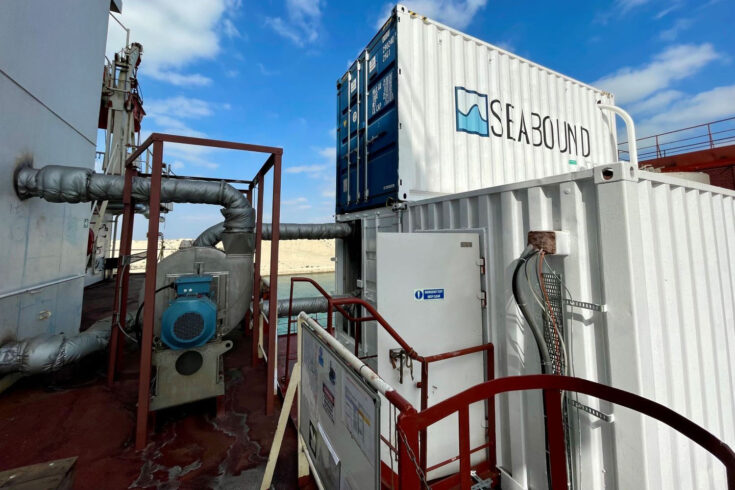Shipping is responsible for around 3% of all greenhouse gas emissions internationally and 5% in the UK. Young climate tech startup, Seabound, plans to help the maritime industry reduce its carbon footprint by capturing emissions at source.
Locking in CO2 emissions
This carbon capture technology can be used on new vessels or retrofitted onto existing ships to trap up to 95% of the emitted carbon dioxide (CO2). The system sits alongside a ship’s funnel, diverting the exhaust into a device where the CO2 chemically reacts with pebbles of quicklime. These then convert into limestone which keeps the CO2 locked in.
The limestone pebbles are unloaded at port where they can be sold for reuse as building materials. Alternatively, they can be re-separated into quicklime and CO2, enabling the quicklime to be reused to capture more carbon, and the pure CO2 sold for utilisation or sequestration.
Shipping decarbonisation
Company co-founder, Alisha Fredriksson, said:
Ships emit over 1 billion tons of greenhouse gases every year, that’s more than airplanes. With new international maritime regulations requiring ships to cut CO2 emissions by 40% within the next seven years, the industry is under a lot of pressure to find workable and cost-effective solutions.
Clean fuels, such as methanol and ammonia, are still 10 to 20 years away, and efficiency measures, such as propeller polishing and air lubrication, aren’t effective enough at reducing a high proportion of CO2 emissions, so we’re aiming to change the course of shipping decarbonisation through this project.
About the funding
The pioneering onboard carbon capture project is part of the Clean Maritime Demonstration Competition Round 3 (CMDC3). This has allocated £60 million to 19 projects from across the UK to deliver real world demonstration projects in clean maritime solutions between April 2023 to March 2025.
CMDC is funded by the Department for Transport as part of the UK Shipping Office for Reducing Emissions programme and is being delivered in partnership with Innovate UK.
London-based Seabound has partnered with Lomar Shipping on the project which received funding of around £1.2 million.
Alisha added:
It was very encouraging and rewarding to receive this funding. It shows that the UK government believes in this technology too. So that’s a pretty significant message for us. It would definitely have taken us a lot longer and been much harder to develop the technology without the funding.
Already there is commercial interest in the technology with six major shipowners signing letters of intent. The company currently has 10 staff with plans for a further three or four roles.

The Seabound team in a shipyard summer 2023.
Credit: Seabound
Top image: The first onboard installation of the Seabound carbon capture device. Credit: Seabound

